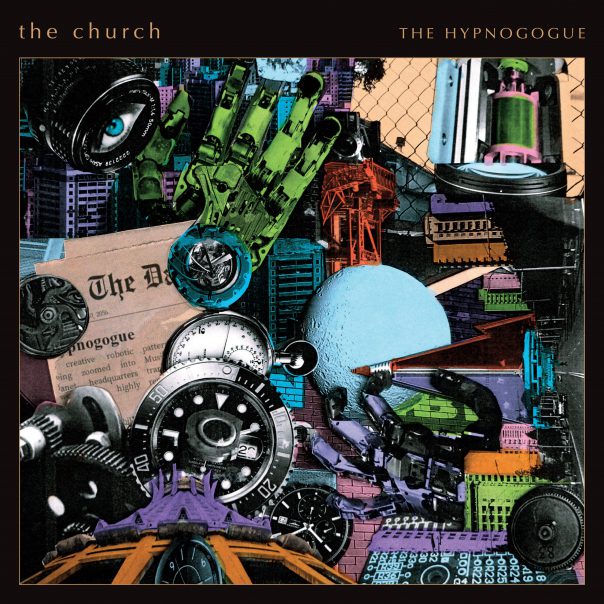ALBUM REVIEW: The Church gets dystopian on ‘The Hypnogogue’

The Church, “The Hypnogugue.”
In the United States, Australian band The Church is best known for 1988 single “Under the Milky Way,” a dreamy acoustic ballad which topped out at No. 24 on the Billboard Hot 100. The song was the soundtrack for a generation of goth teens applying excessive eyeliner and hairspray, or maybe it was just my friends. Along with The Cure, The Smiths and Love and Rockets, The Church’s brooding intensity provided music to sway to.
The Hypnogogue
The Church
Communicating Vessels, Feb. 24
6/10
Get the album on Amazon Music.
Hypnogogue, the band’s 26th(!) album, continues to bear the signature sound of founding member, singer and bass player Steve Kilbey. The album is mannered and dreamy, combining the Britishness of early Pink Floyd like 1968’s Saucerful of Secrets, with the measured intensity of later Pink Floyd albums like 1988’s The Delicate Sound of Thunder. While Australian, Kilbey’s accent and vibe position him with other dapper and aging British crooners of alt-rock, including The Jam’s Paul Weller and The Velvet Underground’s John Cale.
The album’s opener, “Ascendance,” creates a brooding wall of sound with epic drum fills carrying the music through an elaborate series of changes. Fans of the band’s Starfish-era output will recognize Kilbey’s dreamy vocal intonations and lush musical arrangements around relatively straightforward chord progressions played on acoustic guitar. What’s missing is the musical counterpoint of departed guitarist Marty Willson-Piper, who often punctuated Kilbey’s dreamy soundscapes with sharp angular guitar—the best example of which is Starfish’s other single, “Reptile.”
Absent Willson-Piper’s peppery playing, the band’s sound risks complete schmaltzification: a gauzy and dreamlike soundscape of sameness, which lulls the listener beyond complacency. At times, the band’s creative use of dynamics breaks the monotony. On “C’est La Vie” the strummed and jangly acoustic guitar at the song’s outset is supplanted by delicate fingerpicking at the song’s conclusion. The interplay of loud and soft acoustic guitar calls to mind the best songs by Love and Rockets, as well as The Smiths.
Hypnogogue is a concept album. “Invented by Sun Kim Jong, a Korean scientist and occult dabbler, ‘The Hypnogogue’ is a machine and a process that pulls music straight of dreams,” Kilbey has explained, The title track is about Eros Zeta, the biggest rock star of 2054, who has traveled from his home in Antarctica (against his manager’s advice) to use the Hypnogogue to help him revive his flagging fortunes. In the midst of the toxic process, he also falls in love with Sun Kim and it all ends tragically. “C’est La Vie” continues the narrative that serves as a cautionary tale from Zeta’s agent not to mess with the Hypnogogue. His manager has heard some bad rumors about it and he doesn’t want his boy all strung out on this unknown.
During the title track, chiming guitars and cool throaty synthesizer sounds percolate while Kilbey sings, “Remember the music/ Pulled out of your head/ Tinkling piano trickling into the cans/ Insulating guitars/ Reptilian bass, the kick in your face/ The snare in your heart.” On “No Other You,” fat lead guitar tones wheedle and mewl as Kilbey sings about Sun Kim Jong, the story’s protagonist: “Sun comes along/ Moon sings her swan song/ She’s running a muck like fuck/ When the spell is broken/ Love is unwoken/ I’m joking there’s no other you/ There’s no other you.”
“Albert Ross,” a reference to a fictional character in Douglas Adams’ detective novel “Dirk Gently’s Holistic Detective Agency” (or some old British footballer), features some very Zeppelin-like “Going to California” acoustic guitar. On “Aerodome,” Kilbey sings over cinematic and ponderous acoustic guitar, “I hate feeling this alone.”
Forty-three years into their career, The Church has— like many religious institutions—a long and storied career, especially in its native Australia, where it was inducted into the Australian Recording Industry Association’s Hall of Fame in 2010. The band’s latest album is likely to give fans more of what they enjoy, without launching the band up the American charts.
Follow writer David Gill at Twitter.com/saxum_paternus.
